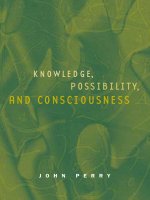the mit press design and destiny jewish and christian perspectives on human germline modification mar 2008
Bạn đang xem bản rút gọn của tài liệu. Xem và tải ngay bản đầy đủ của tài liệu tại đây (1.97 MB, 251 trang )
D e s i g n a n D D e s t i n y
Jewish and Christian Perspectives
on Human Germline Modification
edited by R o n a l D C o l e -t u R n e R
bioethics/religion
We are approaching the day when advances in
biotechnology will allow parents to “design” a
baby with the traits they want. e continuing
debate over the possibilities of genetic engi-
neering has been spirited, but so far largely
confined to the realms of bioethics and public
policy. Design and Destiny approaches the ques-
tion in religious terms, discussing human germ-
line modification (the genetic modification of the
embryonic cells that become the eggs or sperm
of a developing organism) from the viewpoints
of traditional Christian and Jewish teaching. e
contributors, leading religious scholars and writ-
ers, call our attention not to technology but to
humanity, reflecting upon the meaning and
destiny of human life in a technological age.
Many of these scholars argue that religious
teaching can support human germline modifi-
cation implemented for therapeutic reasons,
although they offer certain moral conditions
that must be met. e essays offer a surprising
variety of opinions, including a discussion of
Judaism’s traditional presumption in favor
of medicine, an argument that Catholic doctrine
could accept germline modification if it is ther-
apeutic for the embryo, an argument implying
that “traditional” Christian teaching permits
germline modification whether for therapy or
enhancement, and a “classical” Protestant view
that germline modification should be categori-
cally opposed.
Ronald Cole-Turner is H. Parker Sharp Professor
of eology and Ethics at Pittsburgh eologi-
cal Seminary. He is the author of e New Genesis:
eology and the Genetic Revolution and the co-
author of Pastoral Genetics: eology and Care at
the Beginning of Life.
Basic Bioethics series
“ese essays are a valuable resource in the
debate about germline modification and are
thoughtfully presented to allow for a range of
religious perspectives.”
—Gerald Wolpe, Senior Fellow Emeritus, Cen-
ter for Bioethics, University of Pennsylvania
“is important collection elevates public dis-
course about the ethics of modifying the human
germline and displays the contributions of vari-
ous religious traditions within the debate.”
—Courtney Campbell, Department of Philoso-
phy, Oregon State University
“is book will appeal to scholars and religious
readers, and moreover, help laypeople under-
stand the history and shortcomings of secular
notions like ‘human dignity,’ which are rooted
in religious traditions but don’t survive secular
culture. e contributors show that religious tra-
ditions don’t outright reject all kinds of inher-
itable genetic modification or even enhancement,
but that they are allies in the debate of genetic
modification. ese debates draw our attention
to the complexity of the human ambition and mis-
sion to improve the world.”
—Guido Van Steendam, Director IFB, KULeuven,
Belgium
978-0-262-53301-0
e MIT Press Massachusetts Institute of Technology Cambridge, Massachusetts 02142
D e s i g n a nD De s t i n y
Jewish and Christian Perspectives on Human Germline Modification
edited by Ronald Cole-Turner
Design and Destiny Cole-Turner, editor
Design and Destiny
Basic Bioethics
Glenn McGee and Arthur Caplan, editors
Peter A. Ubel, Pricing Life: Why It’s Time for Health Care Rationing
Mark G. Kuczewski and Ronald Polansky, eds., Bioethics: Ancient Themes in
Contemporary Issues
Suzanne Holland, Karen Lebacqz, and Laurie Zoloth, eds., The Human Embry-
onic Stem Cell Debate: Science, Ethics, and Public Policy
Gita Sen, Asha George, and Piroska Östlin, eds., Engendering International
Health: The Challenge of Equity
Carolyn McLeod, Self-Trust and Reproductive Autonomy
Lenny Moss, What Genes Can’t Do
Jonathan D. Moreno, ed., In the Wake of Terror: Medicine and Morality in a
Time of Crisis
Glenn McGee, ed., Pragmatic Bioethics, 2d edition
Timothy F. Murphy, Case Studies in Biomedical Research Ethics
Mark A. Rothstein, ed., Genetics and Life Insurance: Medical Underwriting and
Social Policy
Kenneth A. Richman, Ethics and the Metaphysics of Medicine: Refl ections on
Health and Benefi cence
David Lazer, ed., DNA and the Criminal Justice System: The Technology of
Justice
Harold W. Baillie and Timothy K. Casey, eds., Is Human Nature Obsolete?
Genetics, Bioengineering, and the Future of the Human Condition
Robert H. Blank and Janna C. Merrick, eds., End-of-Life Decision Making:
A Cross-National Study
Norman L. Cantor, Making Medical Decisions for the Profoundly Mentally
Disabled
Margrit Shildrick and Roxanne Mykitiuk, eds., Ethics of the Body: Post-
Conventional Challenges
Alfred I. Tauber, Patient Autonomy and the Ethics of Responsibility
David H. Brendel, Healing Psychiatry: Bridging the Science/Humanism Divide
Jonathan Baron, Against Bioethics
Michael L. Gross, Bioethics and Armed Confl ict: Moral Dilemmas of Medicine
and War
Karen F. Greif and Jon F. Merz, Current Controversies in the Biological Sciences:
Case Studies of Policy Challenges from New Technologies
Deborah Blizzard, Looking Within: A Sociocultural Examination of Fetoscopy
Ronald Cole-Turner, ed., Design and Destiny: Jewish and Christian Perspectives
on Human Germline Modifi cation
Design and Destiny
Jewish and Christian Perspectives on Human
Germline Modifi cation
edited by Ronald Cole-Turner
The MIT Press
Cambridge, Massachusetts
London, England
© 2008 Massachusetts Institute of Technology
All rights reserved. No part of this book may be reproduced in any form by any
electronic or mechanical means (including photocopying, recording, or informa-
tion storage and retrieval) without permission in writing from the publisher.
For information about special quantity discounts, please email special_sales@
mitpress.mit.edu.
This book was set in Sabon by SNP Best-set Typesetter Ltd., Hong Kong.
Printed on recycled paper and bound in the United States of America.
Library of Congress Cataloging-in-Publication Data
Design and destiny : Jewish and Christian perspectives on human germline modi-
fi cation / edited by Ronald Cole-Turner.
p. ; cm. – (Basic bioethics)
Includes bibliographical references and index.
ISBN 978-0-262-03373-2 (hardcover : alk. paper) – ISBN 978-0-262-53301-0
(pbk. : alk. paper) 1. Medical genetics–Religious aspects–Judaism. 2. Medical
genetics–Religious aspects–Christianity. 3. Genetic engineering–Religious
aspects–Judaism. 4. Genetic engineering–Religious aspects–Christianity. I. Cole-
Turner, Ronald, 1948– II. Series.
[DNLM: 1. Genetic Engineering–ethics. 2. Bioethics. 3. Christianity. 4. Germ
Cells. 5. Judaism. 6. Religion and Medicine. WB 60 D457 2008]
RB155.D42 2008
201′.666065–dc22
2007032376
10 9 8 7 6 5 4 3 2 1
Contents
Series Foreword vii
Acknowledgments ix
1 Religion and the Question of Human Germline Modifi cation 1
Ronald Cole-Turner
2 Judaism and Germline Modifi cation 29
Elliot N. Dorff
3 The Roman Catholic Magisterium and Genetic Research:
An Overview and Evaluation 51
Thomas A. Shannon
4 A Traditional Christian Refl ection on Reengineering Human
Nature 73
H. Tristram Engelhardt, Jr.
5 Germline Gene Modifi cation and the Human Condition before
God 93
Nigel M. de S. Cameron and Amy Michelle DeBaets
6 Human Germline Therapy: Proper Human Responsibility or
Playing God? 119
James J. Walter
7 Germline Genetics, Human Nature, and Social Ethics 145
Lisa Sowle Cahill
8 Freedom, Conscience, and Virtue: Theological Perspectives on
the Ethics of Inherited Genetic Modifi cation 167
Celia Deane-Drummond
vi Contents
9 Religion, Genetics, and the Future 201
Ronald Cole-Turner
Suggestions for Further Reading 225
Contributors 229
Index 231
Series Foreword
We are pleased to present the twenty-third book in the series Basic
Bioethics. The series presents innovative works in bioethics to a broad
audience and introduces seminal scholarly manuscripts, state-of-the-art
reference works, and textbooks. Such broad areas as the philosophy of
medicine, advancing genetics and biotechnology, end-of-life care, health
and social policy, and the empirical study of biomedical life are
engaged.
Glenn McGee
Arthur Caplan
Basic Bioethics Series Editorial Board
Tod S. Chambers
Susan Dorr Goold
Mark Kuczewski
Herman Saatkamp
Chapter 6 by James J. Walter, entitled “Human Germline Therapy:
Proper Human Responsibility or Playing God?” is based on material
previously published under the title “ ‘Playing God’ or Properly Exercis-
ing Human Responsibility? Some Theological Refl ections on Human
Germ-Line Therapy,” in New Theology Review: An American Catholic
Journal for Ministry, volume 10, number 4, November 1997, pp. 39–
59, whose permission to reuse this material is acknowledged with
appreciation.
Chapter 8, “Freedom, Conscience, and Virtue: Theological Perspec-
tives on the Ethics of Inherited Genetic Modifi cation” by Celia Deane-
Drummond, is based on material she fi rst presented as a lecture at
Garrett Evangelical Theological Seminary on April 24, 2003, entitled
“Forbidden Knowledge: A Theologian’s View.”
The idea of this book fi rst arose in the late 1990s when I was a member
of the working group assembled by the Program of Dialogue on Science,
Ethics and Religion of the American Association for the Advancement
of Science as part of a project on Human Inheritable Genetic Modifi ca-
tions. For the opportunities provided by this project, I am grateful to the
AAAS and its staff, to other members of the working group, and to the
Greenwall Foundation for its support of the project.
Religion and the Question of Human
Germline Modifi cation
Ronald Cole-Turner
Advances in biotechnology are bringing us closer to the day when human
beings will engineer specifi c genetic changes in their offspring. Some see
this as the ultimate in human folly. They fear that parents, merely by
knowing they have the option to design the child they want, will forget
how to love the child they are given. Others see such genetic modifi cation
as a logical extension of medicine, consistent with basic human values
and parental love.
Should we encourage the development of this technology and embrace it
when it arrives? Should we human beings modify our offspring through
genetic modifi cation of the human germline? Pondering these possibilities,
Hans Jonas asked: “Whether we have the right to do it, whether we are
qualifi ed for that creative role, is the most serious question that can be
posed. . . . Who will be the image-makers, by what standards, and on the
basis of what knowledge?”
1
With his questions, Jonas calls our attention not
so much to technology as to our vision of a technologically modifi ed human-
ity. What does it mean to be human, to be the sort of human that uses these
technologies, or to be a human being upon whom they are used? What are
the limits of human action, and who or what is guiding the process?
Like Jonas, the contributors to this book call our attention not to
technology but to humanity. They draw upon the resources of traditional
Judaism and Christianity to refl ect on the meaning and destiny of human
life, the values and principles that guide human behavior, and the meaning
of our use of medicine and technology to maintain our health and to
improve our condition.
A public conversation about germline modifi cation has already begun.
So far, however, the partners in the conversation are largely limited to
2 Ronald Cole-Turner
scholars in fi elds such as bioethics and public policy. Aside from isolated
comments and momentary worries about the dangers of “designer
babies” or fi lms such as GATTACA, the wider public has not been
involved. What is needed is a public discussion that is broadly participa-
tory and richly informed, building on but actively expanding the current
discussion, which has largely “been confi ned to elite governmental com-
missions or scholarly groups.”
2
One way to expand the conversation and to engage the public is to
approach the question of human germline modifi cation in religious terms.
Religion is the language of morality for many if not most human beings,
even in late modernity. Beyond its capacity to reach a wider public,
however, religion introduces something new precisely by reintroducing
something old. By drawing attention to rich traditions of belief and
morality, religious voices enrich the debate, adding complexity, multidi-
mensionality, and counterintuitive thinking. For that reason, and not for
mere political sensitivity, religious scholars are often invited to partici-
pate in public discussions of science, technology, and public policy. This
book, too, is based on the hope that religious voices might deepen the
public conversation about human germline modifi cation, taking it to new
dimensions of refl ection on the meaning of our humanity.
Is This Book Really Needed?
Even so, many may think that a book on religious perspectives on
human germline modifi cation is not needed. One reason is that the
technical feasibility of human germline modifi cation is still far off in the
distant future. Overcoming the scientifi c and technological barriers
standing its way will require decades at the very least, it is said, and
once the technical possibility is clearly in sight (if ever), there will be
plenty of time to debate the wisdom and morality of the use of the
technology.
Another reason why some may think this book is not needed is because
religion really has no legitimate or constructive role to play in public
discussions about science and technology. In a secular and pluralistic
age, public conversation about the future of human nature must be
grounded in philosophy, not in religious doctrines. Of course, even in
Religion and the Question of Human Germline Modifi cation 3
our secular era, religion shows no sign of dying. But the religions disagree
with each other on just about everything, and they cannot possibly all
be right. No single denomination or religious institution can claim to
speak for more than a minority. By contrast, it is said, philosophy is
universal in its assumptions and therefore deserves the sort of global
respect that religion can never attain. A third objection is that no one
needs a book to tell them that religious leaders and scholars are strongly
opposed to human germline modifi cation. This is common knowledge,
or so it is thought.
All three objections, however, are based on misunderstandings. The
truth is that a public discussion of human germline modifi cation is timely
because the technology is closer than many think, that each religion and
every philosophy are all limited in the power to persuade more than
minorities, and that a surprising range of religious scholars and leaders
actually endorse some forms of human germline modifi cation. Each of
these points deserves a brief comment.
The Discussion Is Timely
Germline modifi cation of nonhuman species has been under way for
more than twenty years and is becoming routine in areas such as agri-
culture and biomedical research using animals. Researchers have created
transgenic or germline-modifi ed sheep, mice, rats, and even a primate,
the rhesus monkey.
3
The techniques that are used on nonhuman animals
such as sheep or mice involve the production and destruction of many
embryos. These techniques are universally regarded as ethically unac-
ceptable for use on human beings.
Research is currently under way on a wide range of technologies that
might change this situation. No one can predict exactly when or how
these technical hurdles might be overcome, but researchers in the fi eld
generally believe that given enough time, the technology of germline
modifi cation will develop to the point where the techniques themselves
pose no insurmountable ethical obstacle. In other words, some day
human germline modifi cation will be safe and achievable by techniques
that are generally regarded as ethical for use on human beings. When
that happens, the moral question of the wisdom of using the technology
will be squarely before us.
4 Ronald Cole-Turner
While no one can predict how long it will take for research to bring
us to this point, it is clear that recent research has advanced rapidly.
According to the consensus report of a major 2005 study, which uses
the term “human germline genetic modifi cation” or HGGM, advances
in research reported in 2004 and 2005 have “overcome what were
long regarded as impenetrable technical barriers, bringing the possibility
of HGGM much closer. Therefore, the time is right for a new public
discussion about whether, when, and how HGGM research should
proceed.”
4
By one defi nition, human germline modifi cation has already occurred.
In 2001, a reproductive clinic in New Jersey reported success in “the fi rst
case of human germline genetic modifi cation resulting in normal healthy
children.”
5
What they achieved, if it deserves to be called germline modi-
fi cation at all, was highly limited in its scope. Nevertheless, many observ-
ers agree that “the application of the rapidly emerging techniques of gene
therapy to heritable human genetic modifi cation is inevitable.”
6
Many technical diffi culties must yet be overcome before germline
modifi cation can be regarded as acceptably safe for human use, and it is
not clear when and how they will be overcome. There can be little doubt,
however, that in a time frame and through developments we cannot
foresee, some form of human germline genetic modifi cation will become
available in the not-too-distant future and that one day we will wake up
to fi nd ourselves overtaken by “the inevitability of new choices.”
7
If so, then a new discussion should begin before the technology is
entirely in place. Anyone who has ever worried that morality too often
lags behind technology might tolerate our being a little premature. The
new discussion, broadened in its scope and the diversity of its partici-
pants, and drawing upon our collective human resources of moral and
spiritual wisdom, should aim at creating the cultural resources necessary
to illumine the human future, preferably before and not after the technol-
ogy arrives on the scene. The advice of experts is clear: “[I]ndividuals
and public advisory committees would be wise to begin the discussion
of this important topic sooner rather than later.”
8
The time has come to
open up the discussion, to broaden its range of participants, and to bring
to bear the moral and religious traditions that shape our values and our
culture even today.
Religion and the Question of Human Germline Modifi cation 5
Religion and Philosophy Have a Shared Role to Play in Public Debate
Philosophical critics of human germline modifi cation and reproductive
cloning often point to religion as their partner in opposing these tech-
nologies. For instance, Francis Fukuyama and Leon Kass appeal to reli-
gious opposition to biotechnology to win support for their conclusions.
They even praise religion, up to a point. Fukuyama says that religious
objections to biotechnology are to be admired for their clarity and imme-
diacy, for example, the “sharp distinction between human and nonhu-
man creation; [for] only human beings have a capacity for moral choice,
free will, and faith, a capacity that gives them a higher moral status
than the rest of animal creation.”
9
Most of all, religion motivates or
galvanizes resistance. As Fukuyama puts it, “religion provides only the
most straightforward motive for opposing certain new technologies.”
10
Furthermore, “religion often intuits moral truths that are shared by
nonreligious people”
11
Even so, for Fukuyama and Kass, the role of religion is limited. It may
be a useful ally with great powers to mobilize public support, but theol-
ogy is not appropriate for public argument. “While religion provides the
most clear-cut grounds for opposing certain types of biotechnology,
religious arguments will not be persuasive to many who do not accept
religion’s starting premises. We thus need to examine other, more secular,
types of arguments.”
12
Not wanting his own objections to germline
modifi cation to be dismissed as religion, Fukuyama seeks to separate his
argument from religion. “I believe that it is important to be wary of
certain innovations in biotechnology for reasons that have nothing to do
with religion.”
13
According to Leon Kass, secular critics of biotechnology must take
care to distinguish their own philosophical arguments from similar-
sounding religious objections because philosophical or “serious moral
objections . . . are often facilely dismissed as religious or sectarian.”
14
Kass continues: “Religious thought—I would hesitate to call it theoriz-
ing—has its own profound understanding of the human condition and
teachings about the moral life, an understanding deep enough to help us
address the large questions of our humanity at stake in life’s encounters
with biotechnology. But the pluralistic premises of American ethical
discourse and the fashions of the modern academy lead the mainstream
6 Ronald Cole-Turner
to view such religious traditions at best with suspicion and often with
outright contempt.”
15
Philosophy should strip its arguments of “religious
thought.” However, should it fail to do so completely, then “never mind
if these beliefs have a religious foundation—as if that should ever be a
reason for dismissing them!”
16
It is of course true that specifi c religious beliefs are not widely shared
and may even be regarded with contempt or bewilderment by those
outside a tradition. And it is true, as Fukuyama argues, that religious
arguments are not likely to persuade the nonreligious. The same may
surely be said of metaphysics, particularly the sort of metaphysical asser-
tions about human nature employed by Fukuyama and Kass. If the con-
temporary secular academy dismisses religion, it is hardly hospitable to
metaphysics. Outside the academy, the balance of popular support
swings even more in the direction of religion. Of course, the validity of
an argument does not depend at all upon the percentage of the popula-
tion that fi nds it persuasive. However, the point made by Kass and
Fukuyama is not that philosophy is true while religion is not, or even
that philosophy’s presuppositions are more universally plausible than
those of any particular religion, but merely that philosophy is more
popular in its persuasiveness than religion. This is an empirical claim
that lacks support.
More damaging to the philosopher’s case for the superiority of phi-
losophy over religion in public debate is the fact that philosophers dis-
agree among themselves. If disagreements among the religions count
against religion having a public role, the same should be true of philoso-
phy. This is especially obvious when we limit our scope to contemporary
philosophers who have written on human germline modifi cation. Along
with Kass and Fukuyama, Jürgen Habermas has argued on philosophical
grounds against such technologies as human germline modifi cation.
While agreeing in their conclusion that these technologies must be
opposed, Habermas disagrees with Fukuyama and Kass on the basis
for the opposition. Habermas in fact invokes the very argument that
Fukuyama and Kass employ against religion and turns it into an argu-
ment against philosophical metaphysics, which is the foundation upon
which Fukuyama, in particular, bases his argument.
Religion and the Question of Human Germline Modifi cation 7
Fukuyama argues that germline modifi cation would violate human
nature, which “is the sum of the behavior and characteristics that are
typical of the human species, arising from genetic rather than environ-
mental factors.”
17
Then he asks: “What is it that we want to protect from
any future advances in biotechnology? The answer is, we want to protect
the full range of our complex, evolved natures against attempts at self-
modifi cation. We do not want to disrupt either the unity or the continuity
of human nature, and thereby the human rights that are based on it.”
18
Habermas agrees with Fukuyama that human germline modifi cation
is wrong, but he rejects Fukuyama’s line of argument as indistinguishable
from religion. Philosophy must turn away equally from religion and
metaphysics. Habermas warns against relying on “the classical image of
humanity derived from religion and metaphysics.”
19
Modern science has
undermined confi dence in metaphysics and religion equally. Human
“nature” is conceptually adrift and technologically plastic. As much as
he might want to restrain “technical self-optimization” by appealing to
the classical views of a normative human nature, religious or metaphysi-
cal, Habermas warns against such a move. “Unless we fall back on
treacherous metaphysical certainties, it is reasonable to expect persisting
disagreements in the discourse universe of competing approaches to a
species ethics.”
20
Our point is not to disparage philosophy or metaphysics as a public
voice, or even to ask philosophers not to disparage religion while exclud-
ing themselves, but to suggest that in both cases, our powers to com-
municate and to persuade are limited. If so, then perhaps the right
question to ask is this: What do we hope philosophy and religion will
contribute to the public debate on questions like germline modifi cation?
If we hope for arguments that persuade majorities or unify cultures or
justify legislation, we are likely to be disappointed. Such is not the role
of religion or philosophy in today’s context. But if we expect to deepen
the debate, to enrich our understanding, and to pause long enough in
our head-long rush to the future to draw upon traditional sources of
human wisdom and well-tested accounts of human virtue, and if we hope
to argue with fresh vigor while respecting deeply held differences, then
metaphysics and religion may both have something to say.
8 Ronald Cole-Turner
Even today, many still fi nd that religion has unique capacities to
nurture in us that which is compassionate and devoted to the healing of
others for the sake of nothing more than the healing of others, to lead
us beyond a focus on ourselves while at the same time heightening our
awareness of our susceptibility to the old temptations to which technol-
ogy can add unexpected allure. Religion invites us to refl ect on our
weaknesses and anxieties so that we might know ourselves well enough
to avoid some of the exploitations and high-tech seductions that might
otherwise prey upon our fears, making sophisticated fools of us. Taken
seriously, religion reminds us daily to do justice, to guard against new
forms of discrimination and unfairness that might come from expansive
powers, and to seek broad access to the benefi ts of technologically
advanced medicine. All these things religion does in individual lives and
in communities of faith, and in so doing affects the broader culture,
adding to its collective wisdom, maturity, and depth.
Correcting the Record: Religious Support for Human Germline
Modifi cation
It is widely believed that religious scholars and leaders oppose
human germline modifi cation, if not unanimously, then at least by a
wide margin. Kass and Fukuyama assume this when they point to reli-
gion as support for their own objections. This view, however, is mis-
taken, and one of the more important contributions of this book is to
set the public record straight. Religious support for germline modifi ca-
tion is qualifi ed and conditional, of course, but the majority of religious
voices and nearly all the offi cial statements of religious bodies leave the
door open on the question of the morality of genetic modifi cation of
human offspring.
Why is it so often thought that religion is opposed to germline modi-
fi cation? One reason might lie in the public’s tendency to exaggerate
greatly the amount of confl ict between science and religion. While his-
torians of science have long since rejected the idea of warfare between
science and religion, the news media and the general public still believe
that these two arenas of human life are locked into some perpetual state
of confl ict. More often than not, religious scholars and institutions are
supportive of science and technology, especially medicine, complaining
Religion and the Question of Human Germline Modifi cation 9
only of the scientism that sometimes passes for science or specifi c methods
of research, such as experiments involving human embryos.
More than any other, one phrase summarizes the warfare view, espe-
cially in the context of biomedical research and in such areas as human
germline modifi cation. That phrase is “playing God,” which is most
often used as a kind of verbal protest when it is felt that someone is
going too far in making life-and-death decisions for other human beings.
In that respect, the phrase resonates well in a secular society that defends
autonomy, for the person who plays God intrudes not on God’s sover-
eignty, but on the sovereign autonomy of another person. One of
the classic uses of the phrase is found in the writings of a Protestant
theologian, Paul Ramsey, who in the early 1970s wrote in opposition to
the development of in vitro fertilization (IVF) techniques for human
beings. According to Ramsey, “Men ought not to play God before they
learn to be men, and after they have learned to be men they will not play
God.”
21
This phrase has taken on a life of its own and is echoed today by many
who share the idea that there must be limits to the use of biomedical
technology, even by those whose objections are not based in religion.
For example, Leon Kass uses the phrase this way: “By it is meant one
or more of the following: man, or some men, are becoming creators of
life, and indeed, of individual living human beings (in vitro fertilization,
cloning); they stand in judgment of each being’s worthiness to live or die
(genetic screening and abortion)—not on moral grounds, as is said of
God’s judgment, but on somatic and genetic ones; they also hold out the
promise of salvation from our genetic sins and defects (gene therapy and
genetic engineering).”
22
Jürgen Habermas uses the phrase this way:
“ ‘Partner in evolution’ or even ‘playing God’ are the metaphors for an
auto-transformation of the species which it seems will soon be within
reach.”
23
In both cases, these philosophers use this phrase as a kind of
rhetorical shorthand to warn that certain technologies go too far and
that God (or those at least who believe in God) are opposed.
The myth of the warfare and the rhetoric of playing God all came
together in the public theater in 1983 when a large and diverse group of
religious leaders, such as Catholic bishops and Protestant denomina-
tional leaders, signed a highly publicized statement in opposition to
10 Ronald Cole-Turner
germline modifi cation. As much as anything, this event has created the
impression that religious scholars and leaders are united in opposition
to this technology. The statement was developed and promoted, not by
a theologian or church leader, but by Jeremy Rifkin, an economist whose
book Algeny came out the same month. Rifkin was able to secure
the signatures of leaders from across the spectrum of religious bodies,
including the most conservative and liberal Protestants, who sometimes
signed without seeking scientifi c or theological advice. The document,
which is worded as a resolution, comes to this conclusion: “[E]fforts to
engineer specifi c genetic traits into the human germline should not be
attempted.”
24
The fact that this statement was signed by many church leaders, such
as bishops and heads of denominations, certainly lends support to the
claim that Christian leaders are all opposed to germline modifi cation. A
closer examination of the offi cial texts of the religious communities,
however, leads to quite a different conclusion. The next section of this
chapter reviews some of these texts. First, however, it is instructive to
return for a moment to Paul Ramsey, who warned about the dangers of
playing God. In the same book from which that quotation is taken,
Ramsey endorses the idea of human germline modifi cation. Already in
the early 1970s he was able to foresee the possibility of what might lie
ahead and far from condemning it, he strongly endorsed it: “The nota-
tion to be made concerning genetic surgery, or the introduction of some
anti-mutagent chemical intermediary, which will eliminate a genetic
defect before it can be passed on through reproduction, is simple. Should
the practice of such medical genetics become feasible at some time in the
future, it will raise no moral questions at all—or at least not that are not
already present in the practice of medicine generally. Morally, genetic
medicine enabling a man and a woman to engender a child without some
defective gene they carry would seem to be as permissible as treatment
to cure infertility when one of the partners bears this defect.”
25
While
Ramsey is wary of the possibility of playing God, he does not include
human germline modifi cation or genetic surgery under the heading of
the prohibited.
Contrary to popular opinion, religious scholars and leaders are not
unanimously opposed, but are in fact generally open to the possibility
Religion and the Question of Human Germline Modifi cation 11
of a morally acceptable approach to human germline modifi cation. Ever
since the idea of genetic surgery was fi rst discussed in the 1960s, some
theologians and religious ethicists have recognized that germline modifi -
cation may be technologically farfetched, but it is not obviously immoral
or irreligious. In fact, precisely because of their religious convictions,
many religious leaders and scholars over the past few decades have seen
the idea of germline modifi cation as morally preferable to any other
response to the problem posed by the genetic transmission of disease.
Germline modifi cation, for all the challenges it poses, does offer some
hope that an embryo may be treated rather than discarded, or that a
healthy embryo might be created in the fi rst place, and for such reasons
it invites religious consideration by many. According to many religious
scholars and leaders, including most of the contributors to this volume,
germline modifi cation is not obviously wrong but quite possibly is accept-
able under certain conditions. This perspective is clearly present in the
offi cial statements of religious leaders and institutions, the subject of the
next section of this chapter.
Religion and Germline Modifi cation: Cautious, Conditional Approval
Despite its public visibility, the 1983 letter is unique among religious
statements, not just in the widespread but unrefl ective process that pro-
duced it or in its simplistic and categorical judgments, but mainly in its
content. The letter refuses to leave the door open at all to the moral
permissibility of human germline modifi cation. If the letter is unusual, a
more typical statement is found in the publications of the World Council
of Churches (WCC), whose participant churches have a combined mem-
bership of over half a billion and include most Protestant denominations
and Orthodox churches. After much study and review by the member
denominations, the WCC issued a report in 1989 saying that “The World
Council of Churches proposes a ban on experiments involving genetic
engineering of the human germline at the present time, and encourages
the ethical refl ection necessary for developing future guidelines in this
area.”
26
For anyone reading too quickly, the word “ban” jumps out,
confi rming any prior notion that religion opposes germline modifi cation.
Read more carefully, however, the report clearly bases its opposition on
12 Ronald Cole-Turner
safety grounds “at the present time” rather than on permanent moral
grounds.
A similar position was endorsed in 2006 by the National Council
of the Churches of Christ, USA, whose members include most U.S.
Protestant denominations. In its report, the council states: “Effective
germ line therapy could offer tremendous potential for eliminating
genetic disease, but it would raise diffi cult distinctions about ‘normal’
human conditions that could support discrimination against people
with disabilities. But the human community has some time to refl ect
on this conundrum. Inaccuracies in somatic gene therapy have resulted
in activating dangerous nearby genes and led U.S. regulators to tempo-
rarily suspend all human gene therapy using viral vectors. As a result,
the case for germ line therapy, which would affect not only those
presently treated but all their descendants as well, has become even
more diffi cult to make.”
27
The statement carefully notes the advantages
but also the social and moral challenges posed by the prospect of germ-
line modifi cation. It refers to current diffi culties in gene therapy
for human somatic cells, suggesting that these hurdles raise even more
diffi cult challenges to safety that must be met before germline modifi ca-
tion could ever be seriously entertained. The report does not, however,
oppose the idea of germline modifi cation, provided these concerns can
be addressed.
The United Methodist Church, one of the largest Protestant denomina-
tions in the United States, has developed a comprehensive position on
genetics. Generally speaking, the position is cautious, even restrictive. In
1992, the Methodist Church endorsed this statement of opposition:
“Because its long-term effects are uncertain, we oppose genetic therapy
that results in changes that can be passed to offspring (germ-line
therapy).”
28
This wording is modifi ed slightly in 2000:
We oppose human germ-line therapies (those that result in changes that can be
passed to offspring) because of the possibility of unintended consequences and
of abuse. With current technology it is not possible to know if artifi cially intro-
duced genes will have unexpected or delayed long-term effects not identifi able
until the genes have been dispersed in the population.
We oppose both somatic and germ-line therapies when they are used for
eugenic purposes or enhancements, that is, to provide only cosmetic change or
to provide social advantage.
29









